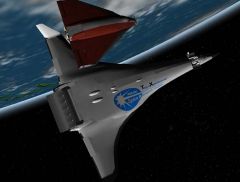Difference between revisions of "TX"
m (Fixed DGex link) |
m |
||
| Line 43: | Line 43: | ||
}} | }} | ||
| − | '''TX''' (or Tug, Experimental) is [[Kulch]]'s experimental winged booster. | + | '''TX''' (or Tug, Experimental) is [[Kulch]]'s experimental winged booster. It is designed to carry payloads up to 50 tons to [[low Earth orbit]]. |
| − | It is designed to carry payloads up to 50 tons to [[low Earth orbit]]. | ||
| − | The main jet installation consists of 6 combined engines, able to work both in an atmosphere and in space, | + | The main jet installation consists of 6 combined engines, able to work both in an atmosphere and in space, and 6 space-only engines. The propellant is liquid oxygen and hydrogen. An air shutter is automatically controlled to maintain maximum efficiency of engines during atmospheric flight; once the engines have switched purely to internal oxidiser, the shutter is closed. Main engines have two modes of operation: take-off and orbital. In take-off mode all 12 engines work (in atmospheric flight, 6 engines). In orbital mode such large thrust is not required, so only 4 engines of the 12 (2 engines in atmospheric flight) work. Orbital mode is also used during landing, since almost all fuel is consumed and the TX is lighter than during takeoff. |
| − | and 6 space-only engines. The propellant is liquid oxygen and hydrogen. An air shutter is automatically | ||
| − | controlled to maintain maximum efficiency of engines during atmospheric flight; once the engines have switched | ||
| − | purely to internal oxidiser, the shutter is closed. Main engines have two modes of operation: take-off | ||
| − | and orbital. In take-off mode all 12 engines work (in atmospheric flight, 6 engines). In orbital mode | ||
| − | such large thrust is not required, so only 4 engines of the 12 (2 engines in atmospheric flight) work. | ||
| − | Orbital mode is also used during landing, since almost all fuel is consumed and the TX is lighter than | ||
| − | during takeoff. | ||
| − | The TX can carry other light vehicles to orbit; it is designed specifically for the [[Delta-glider]] and | + | The TX can carry other light vehicles to orbit; it is designed specifically for the [[Delta-glider]] and [[VTOL-X]], but with an appropriate flight profile it can also be an effective first stage for the [[Deltaglider_EX]]. |
| − | [[VTOL-X]], but with an appropriate flight profile it can also be an effective first stage for the | ||
| − | [[Deltaglider_EX]]. | ||
| − | The TX is tricky to fly, but careful following of the flight profile in the included manual will generally | + | The TX is tricky to fly, but careful following of the flight profile in the included manual will generally get good results. |
| − | get good results. | ||
| − | [[Category: | + | [[Category:Add-ons]] |
| + | [[Category:Vessel add-ons]] | ||
Revision as of 19:19, 7 March 2007
|
Project home: TX at orbithangar.com |
| TX | |
|---|---|

| |
| TX and Delta-glider in low Earth orbit | |
| Description | |
| Role | Atmospheric tug |
| Full name | TX |
| Crew | 3 |
| Passengers | none |
| First flight | date unknown |
| Entered service | date unknown |
| Manufacturer | unknown |
| Dimensions | |
| Length | 110.39 m |
| Height | 22.28 m |
| Wingspan | 85.15 m |
| Wing area | - m2 |
| Masses | |
| Empty | 210,000 kg |
| Fuel | 555,000 kg |
| RCS fuel | 10,000 kg |
| Max. take-off | 825,000 kg |
| Inertia PMI | - m2 |
| Performance | |
| Max. delta-v | ? m/s |
| Max. accel | ? m/s2 |
| Stall CL | ? |
| Stall AOA | ?° |
TX (or Tug, Experimental) is Kulch's experimental winged booster. It is designed to carry payloads up to 50 tons to low Earth orbit.
The main jet installation consists of 6 combined engines, able to work both in an atmosphere and in space, and 6 space-only engines. The propellant is liquid oxygen and hydrogen. An air shutter is automatically controlled to maintain maximum efficiency of engines during atmospheric flight; once the engines have switched purely to internal oxidiser, the shutter is closed. Main engines have two modes of operation: take-off and orbital. In take-off mode all 12 engines work (in atmospheric flight, 6 engines). In orbital mode such large thrust is not required, so only 4 engines of the 12 (2 engines in atmospheric flight) work. Orbital mode is also used during landing, since almost all fuel is consumed and the TX is lighter than during takeoff.
The TX can carry other light vehicles to orbit; it is designed specifically for the Delta-glider and VTOL-X, but with an appropriate flight profile it can also be an effective first stage for the Deltaglider_EX.
The TX is tricky to fly, but careful following of the flight profile in the included manual will generally get good results.